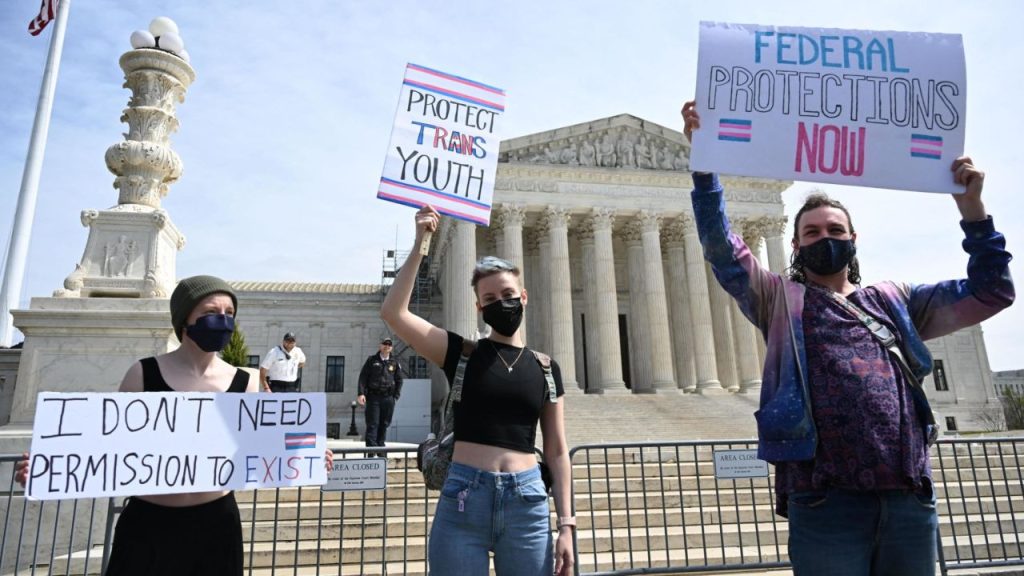Transgender rights take center stage at the US Supreme Court

The issue of transgender rights is once again under intense scrutiny as it takes center stage at the United States Supreme Court. The Court, known for its pivotal role in shaping legal precedents, is currently considering several key cases that could have profound implications for transgender individuals’ rights, particularly in areas like healthcare, employment, and education. With the legal landscape rapidly shifting and a divided public opinion, the Court’s decisions in these cases could fundamentally alter the way transgender Americans interact with institutions and the law.
Background of the Issue
Transgender rights have been a contentious topic in American politics and law for decades, with significant legal battles fought over issues like bathroom access, military service, and discrimination protections. However, in recent years, the conversation has intensified, with many states introducing new laws that either protect or limit the rights of transgender individuals.
One of the most significant legal developments was the Supreme Court’s 2020 decision in Bostock v. Clayton County, which ruled that Title VII of the Civil Rights Act of 1964, which prohibits sex discrimination in employment, also applies to discrimination based on gender identity. This landmark ruling was hailed as a victory for transgender rights, as it protected individuals from discrimination in the workplace based on their gender identity.
However, despite these advances, the rights of transgender individuals remain under threat in various aspects of life, from healthcare to education, with multiple state-level initiatives seeking to restrict access to gender-affirming care, block transgender students from participating in school sports, and prevent the use of gender-neutral bathrooms. These developments have led to increasing legal challenges, many of which are now being taken up by the Supreme Court.
Key Cases Before the Court
The Supreme Court is currently grappling with several high-profile cases that will determine the legal rights of transgender individuals in various sectors. These cases include challenges to state laws that restrict access to gender-affirming healthcare, ban transgender athletes from participating in sports that align with their gender identity, and limit access to public accommodations for transgender people.
1. Transgender Healthcare Rights
One of the key issues before the Court involves the rights of transgender individuals to access gender-affirming healthcare. A case challenging state-level bans on gender-affirming care for minors is among the most important transgender rights cases in recent years. Many states, including Texas and Arkansas, have passed laws that restrict or outright ban gender-affirming procedures, such as hormone therapy and gender confirmation surgery, for transgender minors.
These laws are being challenged in court, with plaintiffs arguing that they violate the constitutional rights of transgender minors and their parents to make healthcare decisions. Supporters of the bans argue that such procedures can be harmful to minors and that parents should not have the right to make irreversible decisions for their children. The Supreme Court’s ruling on this issue could have significant implications for the future of transgender healthcare in the United States, especially in terms of the rights of minors to access care.
2. Transgender Athletes in Sports
Another case that has drawn the attention of the Supreme Court revolves around transgender athletes, particularly transgender women, and their participation in women’s sports. Several states, including Idaho, West Virginia, and Florida, have passed laws banning transgender women from competing in sports that align with their gender identity. These laws argue that allowing transgender women to compete in women’s sports would provide them with an unfair competitive advantage, especially in physical sports like track and field, swimming, and soccer.
Critics of these laws argue that they are discriminatory and that transgender women should have the right to participate in sports consistent with their gender identity, just as cisgender women do. Supporters of the laws contend that they are necessary to ensure fairness in women’s sports. The Supreme Court’s ruling in these cases could set a critical precedent for how transgender rights are balanced with concerns about fairness and equity in competitive sports.
3. Public Accommodations and Gender Identity
Public accommodations, such as bathrooms and locker rooms, are another battleground for transgender rights. Several states have introduced laws that prevent transgender individuals from using public facilities, such as restrooms, that correspond to their gender identity. The most notable example of this is North Carolina’s infamous “bathroom bill,” which sparked national protests and boycotts before it was eventually repealed.
These issues are now being litigated in multiple courts across the country, with plaintiffs arguing that such laws violate transgender individuals’ rights to privacy and equality. The Supreme Court is likely to weigh in on these cases, with potentially broad consequences for the legal treatment of transgender individuals in public spaces.
The Political and Social Climate
The Supreme Court’s involvement in transgender rights cases comes at a time when the political and social climate surrounding these issues is highly polarized. On one hand, there is a growing movement advocating for the rights of transgender individuals, with many seeing the fight for transgender equality as the next frontier in civil rights. On the other hand, there is a vocal conservative pushback, with many lawmakers and organizations arguing that transgender rights should be curtailed, particularly when they conflict with religious beliefs or concerns about fairness in women’s spaces.
This ideological divide is reflected in the legal arguments presented in the Supreme Court cases. Advocates for transgender rights argue that laws restricting access to healthcare, sports, or public accommodations are discriminatory and violate constitutional principles such as equal protection and the right to privacy. Meanwhile, opponents of these rights argue that such laws are necessary to protect women’s rights and maintain the integrity of biological sex distinctions.
The Role of the Supreme Court
As the highest court in the land, the U.S. Supreme Court has the authority to shape the future of transgender rights in the country. Its decisions will influence how state and federal courts interpret the law, and they could either solidify protections for transgender individuals or pave the way for more restrictive policies. The Court’s composition, with its conservative majority, has raised concerns among advocates for transgender rights about the potential outcomes of these cases.
While the Court’s recent decisions on LGBTQ+ rights, such as Bostock v. Clayton County, have been seen as victories, the future of transgender rights remains uncertain. Legal experts and activists are closely monitoring the Court’s actions, knowing that its rulings could either protect or roll back hard-won rights for transgender Americans.
Transgender rights are firmly in the spotlight at the U.S. Supreme Court, with crucial cases that could significantly impact the legal landscape for transgender individuals. From access to gender-affirming healthcare to participation in sports and the use of public accommodations, the Court’s decisions will have lasting consequences for transgender rights in the United States.
As the legal battle unfolds, advocates for transgender equality are hopeful that the Supreme Court will uphold the rights of transgender individuals and protect them from discrimination in all areas of life. However, with the political climate growing more contentious and divided on these issues, the future of transgender rights in the U.S. remains uncertain, with much at stake for the broader LGBTQ+ community and American society as a whole. The outcome of these cases will likely influence the direction of U.S. law and policy for years to come, making the Supreme Court’s involvement in these issues all the more critical.






